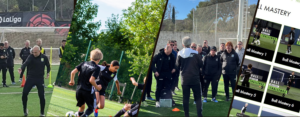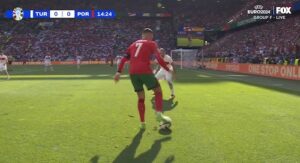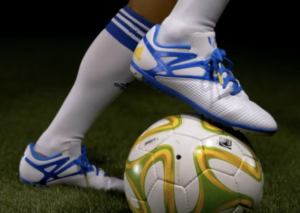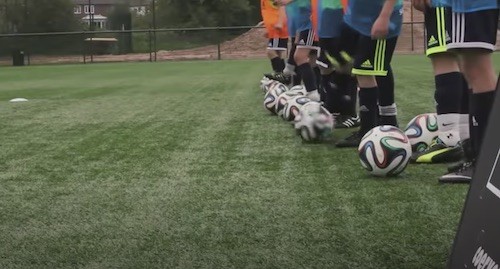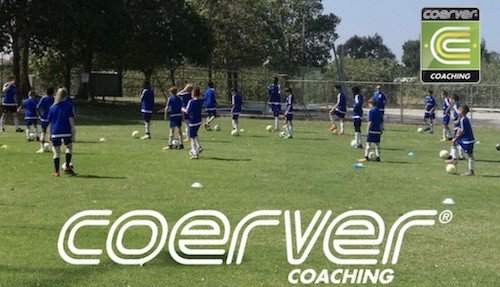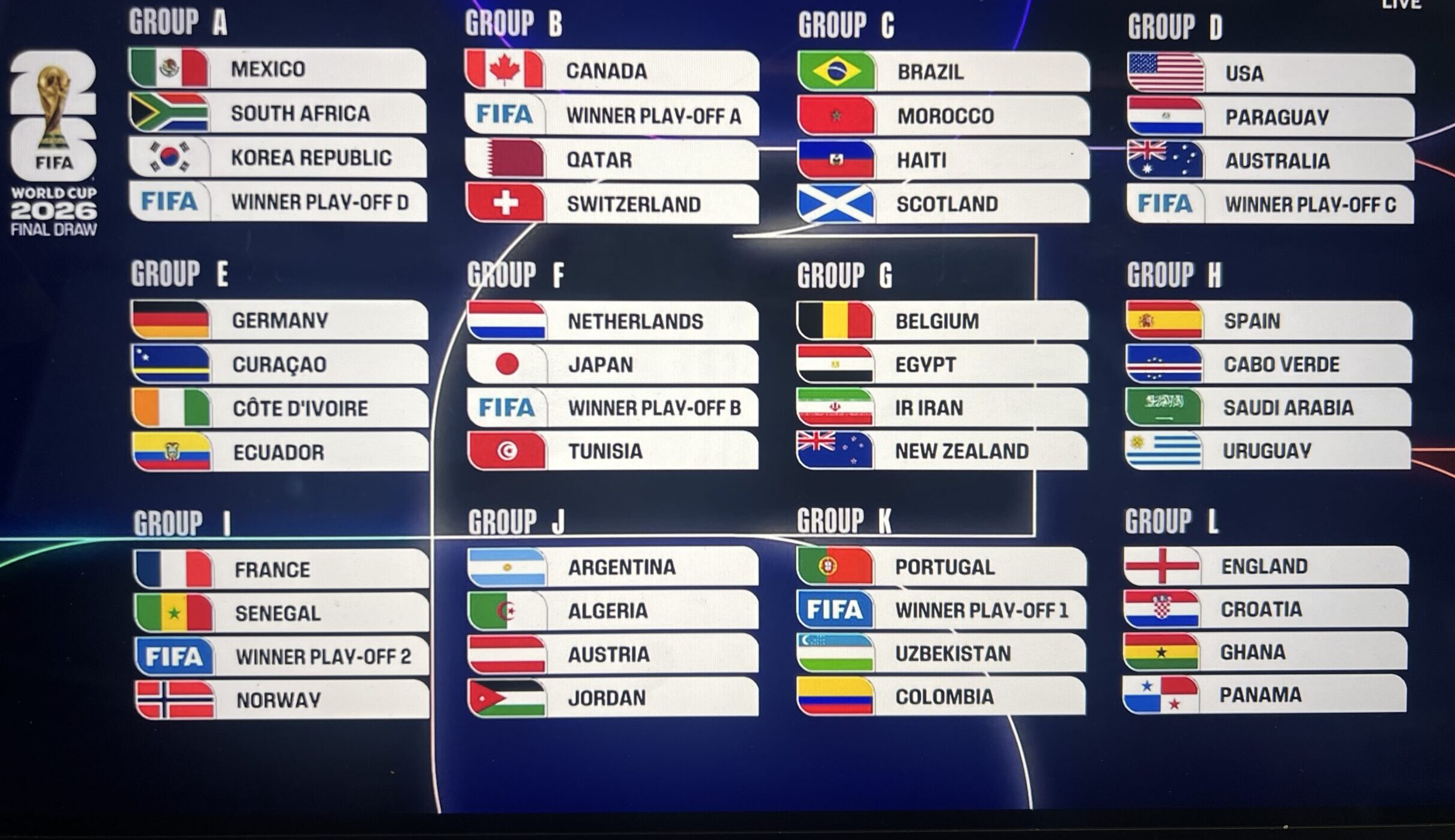Let’s learn how to improve your toddler’s soccer skills. A run down on some soccer practice session for toddlers and what to focus on. What’s key is soccer starts at home, in the house just playing around with the soccer ball. Getting touches on the soccer ball at a young age and just having fun with it. Give kids a chance to get comfortable with the ball and have fun with it.
At the same time, kids like structure, they really do, they want to know and follow the rules of the game. So begin practice with some stretching, then some fun games, some passing drills, shooting on a small goal, and end the practice with a competition. But the key is to let kids get comfortable on the soccer ball and learn to dribble and play with the ball on their own.
Some of these Coerver moves and drills might be more advanced for toddlers, but the idea is right. Get toddlers to manipulate and play with the soccer ball on their own. These Coerver skills will help your toddler improve their skills on the ball.
Improve Your Toddler’s Soccer Skills with Coerver Coaching.
New Coerver PlayerPathway Soccer Training is LIVE!
The main goal is to have fun and get the kids more comfortable with the soccer ball at their feet. Don’t force anything on kids. Kids don’t have to head the ball at 3 to 6 years old. That can come much later, say 15 or 16 years old.
NEW: Tom Byer’s “Soccer Starts at Home” philosophy is based on using the critical influence of parents during early childhood to encourage children to manipulate a small ball (not kick it), in or outside the house, and repeat core moves/skills and empowering parents with basic knowledge of setting achievable tasks and building the child’s interest and motivation through success and encouragement.
Again, for young toddlers, you just want to get them accustomed to the ball, play games like Duck Duck Goose, but with a soccer ball, so they have to dribble around the circle of kids sitting down. Play games like soccer marbles, where kids try to hit their partners’ ball. Or even just try getting kids to kick the ball through a partner’s legs from about five yards away. Relay races are always good too, where you have two different teams and the kids dribble from one line to the other or through a set of cones. Here’s a few soccer games for toddlers you can try:
Improve Toddlers Soccer Skills
- Avoid Land Mines
- Tunnel Passes
- Freeze Tag Game
- Sharks and Minnows
- Hit the Cone
- Knock Out
- Dodge Ball
- Crab Soccer
- Follow the Snake
- Piggy in the Middle
- Soccer Marbles
- Soccer Bowling
- Kangaroo Jumps
At the same time though, it doesn’t hurt to show kids more advanced moves and tricks. The purpose is to get them thinking and trying new things. All kids should know how to cut the ball back, fake one way and go the other, and dribble with at least one foot. Show kids the right way to dribble and kick the ball and play, even if you have to stop the game. It’s important for them to learn the right technique early on.
The keys to improve your toddler’s soccer skills:
- Do the skill with them – demonstrate the move or technique and have them watch you do it over and over.
- Play soccer with them – not saying they can’t have a cookie unless they juggle ten times, but play with them because it’s fun.
- Have them kick the ball around the house – get a nerf soccer ball and let them bang the ball around the halls.
- Get them used to using different parts of their body – kids use their hands all the time, to grab toys, food, and whatever is with in their range, see if they can get more comfortable doing things with their feet.
- Repetition – just like anything, the more you do it the better you get at it.
- Build off of accomplishments – reward them when they do something good and then expand upon that skill.
End the soccer practice with a scrimmage or competition; even if the game turns into a beehive, where you have a few players out wide calling for the ball, it’s a start. Slowly but surely they’ll learn to spread out and pass the ball. Perhaps try have small teams so kids get more time on the soccer ball.
Make sure kids drink plenty of water and keep the practice to around 45 minutes. In the end what idea you want to plant in the kids is they can get better if they want to and their ball is their friend. The more time they spend with the ball the better they will get. They might only be able to juggle the ball into their hands at first, but slowly they’ll start to juggle two, three, four, fourteen to forty times with both feet.
Kids will get so much satisfaction and pleasure from accomplishing something, especially if they like playing soccer. They will get a thrill out of soccer a goal, making a great pass, or winning the ball. Give your kids lots of encouragement and reward them when they do something well.
These are toddlers though, so even though you might want your son or daughter to be the next Messi or Marta, you want them to be laughing and having fun while they play soccer. If not, they’re not going to want to play.
One thing that’s been talked about recently in the soccer coaching world or the youth soccer world at least, is how very young soccer players, say under four or five year olds should start out playing soccer. The big thing is to get kids comfortable on the soccer ball, so just having the ball at their feet and not necessarily even kicking or passing the ball.
Instead, you want toddlers to learn how to turn with the soccer ball or cut the ball or dribble. The idea is to get young kids to figure out that they can manipulate the ball on their own and do different moves even, say the pull back or stopping the ball with various parts of their feet.
And most of all you want very young kids to have fun and to build off of things they’re learning how to do with the soccer ball. Parents can go a long with in get their kids soccer development and having fun and becoming confident, just playing with the ball in the yard or house goes along way with young kids and how they learn to play soccer.
What’s needed though is consistency, so playing soccer with your kids everyday rather than just on the weekends. This is the basis of the soccer starts at home idea.
World-renowned youth soccer trainer Tom Byer presented his “Soccer Starts at Home” philosophy with parents, coaches and educators in the Houston community in partnership with the Dynamo Academy. Improve Your Toddler’s Soccer Skills with Soccer Starts at Home.


